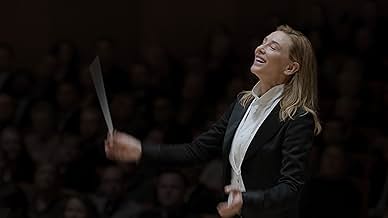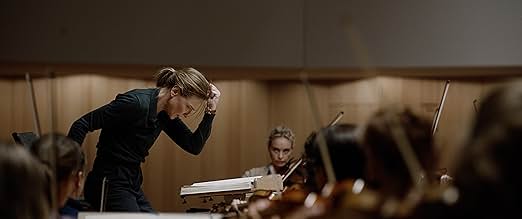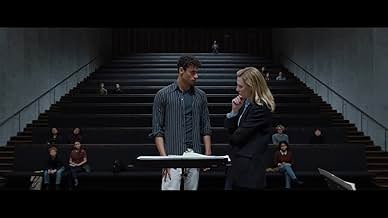Set in the international world of Western classical music, the film centers on Lydia Tár, widely considered one of the greatest living composer-conductors and the very first female director ... Read allSet in the international world of Western classical music, the film centers on Lydia Tár, widely considered one of the greatest living composer-conductors and the very first female director of a major German orchestra.Set in the international world of Western classical music, the film centers on Lydia Tár, widely considered one of the greatest living composer-conductors and the very first female director of a major German orchestra.
- Nominated for 6 Oscars
- 79 wins & 271 nominations total
Zethphan D. Smith-Gneist
- Max
- (as Zethphan Smith-Gneist)
Alec Baldwin
- Alec Baldwin
- (voice)
- Director
- Writer
- All cast & crew
- Production, box office & more at IMDbPro
Featured reviews
Don't be fooled by the great reviews, if you're someone who's not particularly interested in orchestras, conductors and random old musicians from times past, this movie is an utter bore. The first 10 minutes are CREDITS. JUST CREDITS. Then it drags on with the most absolutely annoying, long, mind-numbing scenes where rich, white people just talk to each other about the most esoteric stuff, with cameos of the actress talking to her orchestra about which string needs to be pulled in which direction.
I'm dead serious, 1 and a half hour later, you still can't tell what the hell's going on. It's just scenes of her talking about the most mundane stuff, and playing instruments.
It's a pretentious movie, that appears completely different and way more interesting in the trailer, but in reality is just an elitist blob of nothingness aesthetic. If you value your money and time, don't watch this movie.
I'm dead serious, 1 and a half hour later, you still can't tell what the hell's going on. It's just scenes of her talking about the most mundane stuff, and playing instruments.
It's a pretentious movie, that appears completely different and way more interesting in the trailer, but in reality is just an elitist blob of nothingness aesthetic. If you value your money and time, don't watch this movie.
Initially I was put off by Tár-it's cryptic, drab, and sluggish. Until I realized what the filmmakers were actually accomplishing. No spoilers in this review, but to enjoy the film you have to know certain things:
1. Yes, Cate Blanchett is fantastic and rightfully deserves the accolades.
2. The film is the slowest of slow burns.
3. The film does not hold your hand.
4. The film's narrative cuts out key elements of scenes that other filmmakers would have highlighted. This was the sticking point for me-it didn't dawn on me until halfway through the film what was happening. If you know this going in, I believe you'll have a better experience with the film. The film purposefully *doesn't* show you the "important" elements of scenes or relationships between characters. You have to figure that out yourself, just like putting together the puzzle of who Lydia Tár actually is. Here's a quick non-related example:
Bill stared at the smoke in the frying pan.
Bill rubbed his nose five times and took a call from Ernest while sipping coffee at Station 271.
If those two sentences above were in a book, it would be leaving out major plot points that other authors would have filled in. First, there was a fire in Bill's kitchen. He called the fire department. He had to evacuate, so the fire may have been bad. And who is Ernest, if we have not been introduced to that character before? Why is bill rubbing his nose so much? Is it a tick or OCD or nervous habit?
That's what Tár is like. It presents to you all the items "between the lines" and lets you solve for X for yourself. Once I understood that that was the dominant cinematic approach in this film, it became immensely more enjoyable...and challenging. Very much worth your time if you put in the effort.
1. Yes, Cate Blanchett is fantastic and rightfully deserves the accolades.
2. The film is the slowest of slow burns.
3. The film does not hold your hand.
4. The film's narrative cuts out key elements of scenes that other filmmakers would have highlighted. This was the sticking point for me-it didn't dawn on me until halfway through the film what was happening. If you know this going in, I believe you'll have a better experience with the film. The film purposefully *doesn't* show you the "important" elements of scenes or relationships between characters. You have to figure that out yourself, just like putting together the puzzle of who Lydia Tár actually is. Here's a quick non-related example:
Bill stared at the smoke in the frying pan.
Bill rubbed his nose five times and took a call from Ernest while sipping coffee at Station 271.
If those two sentences above were in a book, it would be leaving out major plot points that other authors would have filled in. First, there was a fire in Bill's kitchen. He called the fire department. He had to evacuate, so the fire may have been bad. And who is Ernest, if we have not been introduced to that character before? Why is bill rubbing his nose so much? Is it a tick or OCD or nervous habit?
That's what Tár is like. It presents to you all the items "between the lines" and lets you solve for X for yourself. Once I understood that that was the dominant cinematic approach in this film, it became immensely more enjoyable...and challenging. Very much worth your time if you put in the effort.
If you are not familiar with classical music, probably almost the entire first hour will be very difficult to sit through. The dialogue is PACKED with references to classical music artists/works/history/etc. Not to mention there are constant little allusions to different plot threads which make up Tar's whole story.
However, this dies down gradually and the movie becomes much more focused and simple. Blanchett is incredible, but not in a showy way at all. Her conducting moments were awesome. The story is political and relevant, and handled very well and balanced-like.
There is a surprisingly creepy vibe to the film, that borders on something almost like a horror movie at times. It's quite unnerving.
One of the best movies i've seen all year! Probably Todd Field's best work yet.
However, this dies down gradually and the movie becomes much more focused and simple. Blanchett is incredible, but not in a showy way at all. Her conducting moments were awesome. The story is political and relevant, and handled very well and balanced-like.
There is a surprisingly creepy vibe to the film, that borders on something almost like a horror movie at times. It's quite unnerving.
One of the best movies i've seen all year! Probably Todd Field's best work yet.
Tár is a dense film. Thick with dialogue and emotional power. It's also a bit tricky to get in to and might be a bit much for the casual viewer. That's a shame though as it's great. Lydia Tár (Cate Blanchett) is a renowned concert conductor. An opening montage leads us into a live interview with the New Yorker, introducing her achievements to date. Let's just say it's a stellar CV. Right from the off, Tár is a force. Confident and assertive, but there are hints of the smallest of cracks. People will often misunderstand the role of a conductor, reducing it to something almost needless. Director and writer Todd Field knows this and lets that opening interview roll, as a device it not only introduces us to Tár, but the world of classical orchestration and her interpretation of it. Like I said, dense. At the top of her game, there's plenty of admirers, both publicly and professionally. Like Elliot Kaplan (Mark Strong) with a fantastic wig, who's told "There's no glory for a robot, do your own thing". Or a room full of nervous students at Juilliard, who also feel the wrath of Tár's uncompromising views. She's putting a lot of herself out there, is she as certain of herself as she appears though and when everything appears so perfect and controlled, what aren't we seeing. Those potential cracks show themselves through Francesca (Noémie Merlant), she's the assistant. Seemingly subordinate, she's clearly privy to some weakness, could be the weakness, or quite the opposite. Tár's partner Sharon (Nina Hoss) too. She has a fragility and brings out a tenderness in Tár, but there's something else. It's clear that Tár intends on retaining her position, status, power. Ruthlessly if required. These personal moments though really help the flow of this film. Although slightly bleak, they're a breath of fresh air in Tár's austere world. It's a beautiful world though. Rooms vast with modernist lines and understated grandeur. I find myself lost in these spaces as Tár too begins to ebb. I can imagine that classical music students might lap the opening acts up, it feels important. Is it though, or is it an impenetrable pretentious three hour indulgence. I'd say it's neither. It's a slow burning drama. That doesn't so much as unfold as gently slides into a darkness as Tár's facade crumbles. Accelerated by the arrival Olga (Sophie Kauer) a no nonsense Russian cellist, brought in to help a live performance recording of Mahler's Symphony No.5... but is anything but a stabilising presence. It demands your attention. Blanchett is incredible. It's an explosive performance. Utterly captivating. A singular pivotal presence. "It's not a democracy". She needs to be too. At not far off 3 hours, it's an intense experience. Be prepared to be patient, but you will be rewarded.
During the first minute of this film, Cate Blanchett shows what an extraordinary actress she is. Her character, star conductor Lydia Tár, is waiting to go onstage. There is no dialogue, only body language. But even without words, Blanchett shows what Tár thinks and feels.
Blanchett's remarkable performance is a large part of what makes this a good movie. But there's more. The very clever script gives us a lot to chew on afterards. Tár is a woman in the men-dominated world of classical music. She's not warm, empathic or even very sympathetic. In fact, she has many characteristics that are usually associated with men. She's vain, selfish and manipulative. And that's what gets her in trouble. At the start of the film, she seems to be one of the most admired women in the world. She is extremely famous and successful. At the end, everything has fallen apart.
The film doesn't judge. It leaves it up to the viewer to decide if Lydia Tár is a victim or a culprit. Or maybe both at the same time. The viewer gets a lot of information to make up his (or her) mind. Director Todd Field gives us the story elements slowly, bit by bit. Take the scene where Lydia Tár gives a stern speech to a young girl who bullies her daughter. It shows that she is used to getting everyone in line, according to her wishes. That's useful information to interpret things later on in the movie.
Tár is very much a modern movie. It has things to say about gender, about power, about social media, about being woke. But at the same time, it's a very old-fashioned movie. It takes its time. There are long scenes, and long takes. There's nothing modern in the way it is filmed. And that's a good thing.
Blanchett's remarkable performance is a large part of what makes this a good movie. But there's more. The very clever script gives us a lot to chew on afterards. Tár is a woman in the men-dominated world of classical music. She's not warm, empathic or even very sympathetic. In fact, she has many characteristics that are usually associated with men. She's vain, selfish and manipulative. And that's what gets her in trouble. At the start of the film, she seems to be one of the most admired women in the world. She is extremely famous and successful. At the end, everything has fallen apart.
The film doesn't judge. It leaves it up to the viewer to decide if Lydia Tár is a victim or a culprit. Or maybe both at the same time. The viewer gets a lot of information to make up his (or her) mind. Director Todd Field gives us the story elements slowly, bit by bit. Take the scene where Lydia Tár gives a stern speech to a young girl who bullies her daughter. It shows that she is used to getting everyone in line, according to her wishes. That's useful information to interpret things later on in the movie.
Tár is very much a modern movie. It has things to say about gender, about power, about social media, about being woke. But at the same time, it's a very old-fashioned movie. It takes its time. There are long scenes, and long takes. There's nothing modern in the way it is filmed. And that's a good thing.
Did you know
- TriviaProfessional cellist Sophie Kauer had no prior acting experience and auditioned at the encouragement of a friend. She learned to act by watching YouTube tutorials hosted by Michael Caine.
- GoofsWhen Lydia is talking to the two technicians after a rehearsal in Berlin, she requests they send her audio and video recordings, but the console in front of them in the booth is actually for controlling lights, not audio/video.
- Crazy creditsThe opening credits presents the film crew and acknowledgments (usually shown at the end titles) without presenting the actors. The actors and soundtrack are shown at the ending without the crew.
- ConnectionsEdited from The Blair Witch Project (1999)
- SoundtracksDas Wohltemperierte Klavier: Präludium and Fuge C-Dur, BWV 846
Written by Johann Sebastian Bach
Piano, Cate Blanchett
- How long is Tár?Powered by Alexa
Details
- Release date
- Country of origin
- Official sites
- Languages
- Also known as
- Tar
- Filming locations
- Dresden, Saxony, Germany(Kulturpalast & Großen Garten Platz)
- Production companies
- See more company credits at IMDbPro
Box office
- Budget
- $25,000,000 (estimated)
- Gross US & Canada
- $6,773,650
- Opening weekend US & Canada
- $158,620
- Oct 9, 2022
- Gross worldwide
- $29,177,163
- Runtime
- 2h 38m(158 min)
- Color
- Sound mix
- Aspect ratio
- 2.39 : 1
Contribute to this page
Suggest an edit or add missing content



































